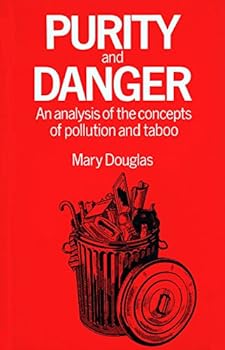Purity and Danger: An Analysis of the Concepts of Pollution and Taboo
Select Format
Select Condition 
Book Overview
With a specially commissioned preface by the author which assesses the continuing significance of the work, this Routledge Classics edition will ensure that Purity and Danger continues to challenge,... This description may be from another edition of this product.
Format:Paperback
Language:English
ISBN:0710088272
ISBN13:9780710088277
Release Date:January 1978
Publisher:Routledge & Kegan Paul
Length:196 Pages
Weight:0.58 lbs.
Customer Reviews
5 ratings
Great service!
Published by Thriftbooks.com User , 15 years ago
Even during the busy holiday season, the book arrived as promised and ON TIME! Great job!
classic work
Published by Thriftbooks.com User , 17 years ago
This is one of the most famous and still relevant works about what are behind any given cultures concepts on cleanliness and impurity. Written in an accesible language so even interested laypersons can benefit from Mary Douglas' scholarly research. If you are intersted in Biblical criticism and/or anthropology - this book belongs in your bookshelf. It is simply a classic.
Clean or dirty? Your culture decides.
Published by Thriftbooks.com User , 24 years ago
All cultures have definite ideas about what is clean and what is dirty. Drawing from previous hallmark works on how cultures make classifications (Levi-Strauss's The Raw and the Cooked, etc.), Douglas makes clear and concise arguments about the use of ritual in separating that which is considered pure from what's considered unclean. The convincing argument she makes is that such rituals and clearly defined boundaries of purity reinforce a society's common definitions, increasing its unity and therefore its ability to work together to succeed. Additionally, Douglas alludes to Malinowski's anxiety-reduction theories of totems to theorize that clear definitions of right and wrong and of clean and unclean reduce the stress in a given society, helping everyone to know who they are and what is expected of them. In fact, she feels, a lack of such distinctions can be fatal to the integrity of a group. If everyone went on their own deciding what was good or bad, there would be chaos - the danger alluded to in the title.A highlight of the book is the chapter titled "Abominations of Leviticus", in which she interprets the Jewish divisions between kosher and graev (no pork, no mixing of milk and meat, etc) in a cultural context. Here she shows that the Levites divided "pure" animals (deer, cattle, sheep, goats, etc) from those considered "mixed" (pig, rabbit, woodchuck), or having an undesireable combination of traits rather than just being dirty in aspect, as is commonly believed.
pangolin stew
Published by Thriftbooks.com User , 25 years ago
Why was one locust cleaner than the other? Man, I had no idea either till I picked up this book. In fact, I had no idea that Jewish dietary laws made any distinctions at all on the locust front. (I mean, as far as I'm concerned, you could leave the locusts off the menu altogether and it's a fair bet I wouldn't even notice.) Mary Douglas, extensively supported by a gaggle of other similarly academically endowed individuals in quote form, however, delves right into the whole locust conundrum and she does it in a truly fascinating manner. What begins as a graceful though predictable swan dive assessment of profanity as disruption of cultural order jack knifes thrillingly there in the middle to talk about physical creatures as metaphoric representations of religious and cultural values. The book starts out talking about dirt and ends up in a fascinating examination of how we as humans, both "primative" and "civilized", twist our concrete world to become metaphor for psychological and spiritual experience Cool, huh. Also, as an added treat, Douglas spends A LOT of time talking about the South American Lele cult of the pangolin. (For laypeople, that's that funny armadillo/anteater thing that looks quite alot like a pinecone.) Douglas takes some fairly weighty theories of cultural anthropology and turns them into an entertaining and infinitely readable piece. A nice trick. Oh, and did I mention the anteater? What's not to love?
Excellent Antropological Study
Published by Thriftbooks.com User , 26 years ago
Douglas's view of ritual across human cultures paints an accurate and thought-provoking picture. Her analysis of the cause and effect of ritual will satisfy not only the scholar, but also the general reader. Of particular interest is the section on Moses and the Torah.





